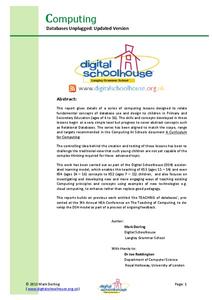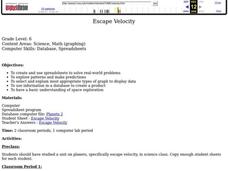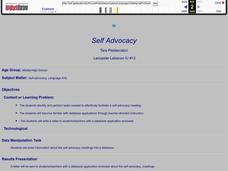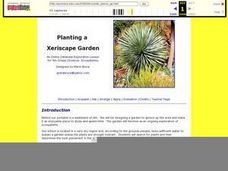Teach Engineering
Storing Android Accelerometer Data: App Design
There's an app for that! Pupils learn to build an app that will store data on an Android. The lesson introduces class members to the tiny database, TinyDB, for Android devices. A video tutorial provides an example that uses the TinyDB in...
Computer Science Unplugged
Computing: Databases Unplugged
How do databases store and retrieve information? The activities in the resource provide fundamental concepts of databases by introducing an approach that teaches the basics without using computers. The pupils act as the actual data that...
Curated OER
Digging Up Dinosaurs
Students research dinosaurs using text, software, and Internet resources while role playing as paleontologists. They place the information from their research in databases and publish an illustrated page about their findings.
Curated OER
European Elevation Sort
Given a prepared database of European countries, sixth graders sort the countries in ascending order by elevation and identify the five countries with the highest elevations. This cross-curricular lesson combines elements of computer...
Curated OER
Metrically Me!
Young scholars define the parts of a database, search strategies to locate information electronically, create/modify databases, etc. and enter data into a prepared spreadsheet to perform calculations.
Curated OER
Escape Velocity
Sixth graders create/use spreadsheets to solve real-world problems, explore patterns, make predictions, select/explain most appropriate types of graph to display data, use information to create product, and have basic understanding of...
Curated OER
Finding Your Way in the World Wide Web
Researchers practice grouping items to explore the concept of a database. They apply these concepts to the WWW search engine format and consider why it is important to enter the most specific information.
Curated OER
The 50 States
Fifth graders use a database to gather information on the United States. Using this information, they try to describe the settlement patterns in the various states. They enter additional information into the database and use queries to...
Curated OER
Self Advocacy
Students determine the procedures for facilitate a self-advocacy meeting. They enter information about the meetings in a database which they include in a letter summarizes the meeting.
Curated OER
Review of the United States of America
Students research and compile information for each US state. They write a paragraph on one of the topics found within the database comparing at least 2 states. They create a database with the information they collected about each US state
Curated OER
Organizing our Favorite Books
Students identify the title and author of stories. They create a database that supplies both graphic and written information to identify a book.
Curated OER
Kinzi Deaf Alumni
Learners use data of school alumni to create a database. The lesson uses technology and access to a computer lab is essential. The concepts of graphing statistics is also used to help teach across the curriculum.
Curated OER
Land or Sea?
Sixth graders access a database to search for desired information, using "and" or "or" connectors where necessary. They choose a connector and search a prepared database of European countries to locate which countries border certain...
Curated OER
States Database Searching and Sorting
Fifth graders search and sort prepared databases for information to use in classroom projects, locate, gather, evaluate, organize, and analyze information.
Curated OER
What Does George W. Bush Have in Common With Past U.S. Presidents?
Sixth graders discover what it takes to become President of the United States. Using a database, they complete a scavenger hunt to determine what George W. Bush has in common with past Presidents. They also create a spreadsheet which...
Curated OER
Get Ready For Some Football
Sixth graders compare and contrast the totals from two national football teams for the year. Using the internet, they search for the information they need and create a data bar graph. They use the information they collected to answer...
Curated OER
Exploring National Flags
Sixth graders examine the importance of flags throughout the world. Examining different countries, they determine the geographical and historical contributions in the past and modern times. They compare and contrast the flags of five...
Curated OER
How Much Do You Burn?
Sixth graders discover their weight relative to the other children in their class. They determine how many calories they burn through exercise and compare it with their classmates. Using the internet, they calculate their body mass index...
Curated OER
Dino-Facts!
Students use a database to gather facts about dinosaurs. They practice searching about specific dinosaurs that are of interest to them. To end the instructional activity, they write a story describing the behaviors, eating habits, and...
Curated OER
What Do They Have In Common?
Fifth graders use a database to gather information on the United States last five Presidents. Using the information, they identify their similarities and differences and what characteristics made them a good leader. In further detail,...
Curated OER
You Are What You Eat!
Fourth graders discover the nutritional needs of their bodies. Using a database, they research how nutrition affects their learning capabilities. They take the food they eat on a daily basis and discover its nutritional value. They...
Curated OER
Food Chain
Fourth graders use a database on animal diversity to complete the lesson. Using the information, they discover how organisms are linked to one another by their dependence on each other for food. In groups, they develop their own food...
Curated OER
Planting a Xeriscape Garden
Fourth graders use a plant database to discover new vocabulary associated with plants and ecosystems. Using a pile of dirt behind their school, they design a garden to make it a more enjoyable place. They print out the types of plants...
Curated OER
California Missions
Fourth graders use what they already have gathered on California missions to create a database. Using the different missions, they brainstorm, organize and categorize what they have gathered. They present their material to the class and...

























